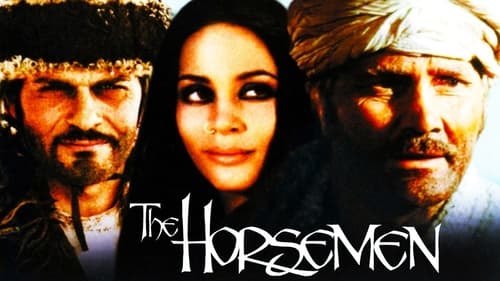tintin-23
This movie, which I saw for the first time in 1971, changed my life forever. From the first moments of the film, I was struck by the stunning Afghan scenery. Over the next three years, I visited Afghanistan three times. It was a fantastic adventure, like a voyage in another time, on another planet. Since then, I have not stopped traveling in this part of the World.The film is based on Joseph Kessel's novel, "Les Cavaliers," written following his travel throughout Afghanistan in the early 60's. Kessel is, in the tradition of Saint-Exupery, Malraux, Pierre Mac Orlan, and Hemingway, an adventurer, journalist, globetrotter, and great writer, a man who tried to make the novel "the privileged expression of the experienced adventure." The action takes place on the vast plains around Maimana in the northwest of the country, across the Hindu Kush, and in Kabul. The drama revolves around the "mad horse," Jahil, with its almost human presence. Uraz, son of the great "chapendaz" Tursen is to ride Jahil, Tursen's latest prized white stallion, in the great "buzkashi" of the King, in Kabul.The Afghan national game of "buzkashi" dates back to the time of Ghengis Khan. In this fierce competition, played on the northern steppes by expert horsemen, everything goes. Hundreds of "chapendaz" horsemen independently compete to grab and carry the carcass of a goat or a small calf to the circle of justice, outlined on the field.If Uraz wins, Jahil is his to keep. How can he not win? "If you cannot win on Jahil, you cannot win on any horse," says Tursen. Uraz, like his father before him, is now the most famous "chapendaz" in the "three (northern) provinces." Nevertheless, his quest for glory seems endless, as an inner demon keeps driving him to surpass both his father and himself. An old lady in the bazaar says of him, "If you wager him for glory, you will lose. If for money, you will win." At the "buzkashi" in Kabul, Uraz will know defeat. He not only loses the game, but his leg is fractured. His life lesson about pain and hate begins as he returns to Maimana, vanquished, prouder, more resolute, and crazier than ever.Uraz has the choice of two roads to return to Maimana: the relatively easy road across the terrible Hindu Kush Range, through the Salang Pass, the World's highest pass at 10,000 feet, or the dreadful "old road," running through the Unai and Hajikak passes, both also near 10,000 feet, Bamiyan, followed by more high passes, before finally arriving on the northern steppes. Of course, Uraz chooses the "old road," challenging himself to the limit, in order to redeem himself in his own eyes, and also those of his father. For all his toughness, his father had never traveled that road.As if the "old road" was not challenge enough, Uraz, whose fractured leg is fast becoming gangrenous, tempts his "sais" (groom), Mokkhi, with a pact that involves ownership of the magnificent Jahil.On the road, Mokkhi, meets with love in the arms of the beautiful "untouchable," Zareh, but also experiences greed, a taste for murder, and a pitiful downfall. Zareh, as beautiful as she is devious, inspires Mokkhi to murder and destruction. She is herself tormented by "the horse": "Do you know, great Prince, what brought me to you that first night?...it was the horse." Along this endless "old road," the trio each confronts the worst in themselves, and arrive at their destination perverted and lost. There is also the mysterious and likable character, Hayatal with whom Uraz will eventually continue wandering the steppes.The movie, filmed for six months in Afghanistan, and then in Spain, in 1969-1970, was directed by John Frankenheimer. Screenwriter Dalton Trumbo recognized there was no need to embellish Kessel's fantastic adventure, and faithfully followed the book's story line.The stunning cinematography is the result of the collaboration of the distinguished French cinematographer Claude Renoir (of the artistic lineage,) Andre Domage, and James Wong Howe. They give an accurate taste of the beauty of the rugged Afghan country and of its people. In particular, the remarkable sequences of the buzkashi of the King, in Kabul, and the flashback of Tursen's buzkashi, through the great open steppes of the north, are worth the admission by themselves. There are also actual scenes of organized fights between camels, rams, and partridges (the Afghans are big gamblers).The casting of westerners as principles may seem strange at first, until one remembers that there were neither TV nor movies in Afghanistan, in 1970, and therefore no Afghan actors. Frankenheimer wanted Yves Montand or James Garner for the lead, but learning that he was an expert rider, chose Omar Sarif instead. The buzkashi scenes required 25 days of shooting. Of course, Sharif had to appear in some of these scenes, but the chapandaz, impressed by his superior riding, unobtrusively "chaperoned" him through the most dangerous moments. Omar Sharif gives one of his best, if not the best, performances ever. On the other hand, Jack Palance was not skillful enough to ride in the mayhem of the game, and required an Afghan rider stand-in for these sequences. However, with his both feet on the ground, Palance's presence on the screen is overwhelming. As I traveled through the northern provinces of the country, I must have met two or three Palances, and as many Sharifs. By some extraordinary coincidence, Leigh Taylor-Young also bears a strong resemblance to the now famous "Afghan girl," who appeared on the front cover of the National Geographic Magazine, in 1984.The renowned French composer Georges Delerue wrote the music, remarkable in its lyricism and romanticism, which integrates itself perfectly in the film."The Horsemen" is a stunning film, inspired by epic adventure and timeless conflicts which, given the present condition in Afghanistan, I am afraid can only now be experienced in an armchair.



